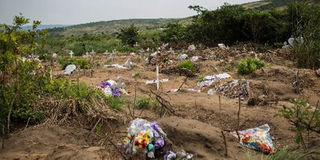Kabila can preside over free, fair and credible elections or cling to power

Flowers are seen on April 7, 2015 at the Maluku cemetery, about 100 kms from Kinshasa. A rights group and an opposition lawmaker called on April 7 on the government to investigate the late night burial of at least 421 bodies last month. AFP PHOTO
What you need to know:
- Three days later, government spokesman Lambert Mende, said there would be no exhumation. He explained human rights organisations or state officials had no right to make the request.
- That left suspicions the corpses have something to do with and the aftermath of January protests against a law requiring a national census before elections, including presidential, are held next year.
- Thus protesters hit the streets on January 19. The government said 41 people died. Hardly anyone believes it. There are other unsubstantiated reports arrests continued and some of those arrested were never seen again.
The Democratic Republic of Congo was in the news late last week for a rather bizarre reason: a mass grave. The official explanation was equally bizarre.
On Friday, the United Nations and the European Union called for urgent investigation of the grave in Muluku district about 100 kilometres from the capital, Kinshasa.
The UN human rights office in Geneva the investigation should be in a “transparent, credible and independent manner. the AFP news agency reported.
It further said the UN office in Kinshasa, while calling for similar investigations, offered “all means at our disposal.” Belgium, the country’s former colonial ruler and human rights groups, including Human Rights Watch, also called for an independent inquiry.
The Voice of America reported on April 6, 2015, information about the grave came to light after residents reported a foul smell near a cemetery. The government explained about 421 corpses of stillborn babies and unclaimed bodies were buried overnight.
The interim governor of Kinshasa, Robert Luzolamu Mavema, added “credence”, saying the Red Cross Society in the DRC had handed over some of the corpses.
Justice Minister Alexis Thambwe, the VOA reported, said the government was prepared to exhume the corpses if anyone raised “slightest doubts” about the circumstances of the deaths.
NO EXHUMATION
Three days later, government spokesman Lambert Mende, said there would be no exhumation. He explained human rights organisations or state officials had no right to make the request.
Questions arose quickly. Mr Martin Fuyulu, leader of the Committee for Citizens and Development Party, wondered why the corpses were buried at night. As for the source, the Red Cross, the VOA reported, quickly denied involvement.
That left suspicions the corpses have something to do with and the aftermath of January protests against a law requiring a national census before elections, including presidential, are held next year.
Critics said the law aimed at extending President Joseph Kabila’s mandate. His second five-year term ends late next year.
Thus protesters hit the streets on January 19. The government said 41 people died. Hardly anyone believes it. There are other unsubstantiated reports arrests continued and some of those arrested were never seen again.
Anyway, four days after the protests the legislature amended the law and expunged the offending clause, earning praise from the likes of US President Barak Obama. Fuyulu doubts that’s the end of Kabila’s attempt to prolong his rule. Might last month’s DRC’s demand for the removal of thousands from 20,000 UN peacekeepers in the country is pointer to that?
Not so, according to Mr Mende. He said in January: “President Kabila will end his mandate in 2016, wait and see.”
Kabila, 43, became president in January 2001 after the assignation of his father, president Laurent Desire Kabila. He has won elections twice.
Under his rule and with UN and regional leaders’ abundant help and patience the DRC has edged from chaos to words a semblance of normalcy.
Well, as his constitutional mandate ends, he has two choices: either presides over free, fair and credible elections, becoming a good loser, if that’s the outcome, or clings to power and leave a legacy of president of the land of mass graves. January protests might portend hindsight in advance.




